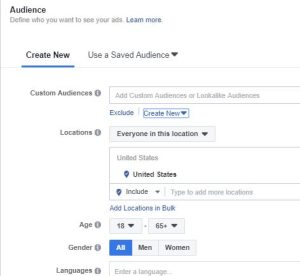One of the most powerful marketing features of sites like Facebook is the ability to target messages to specific groups. If you’re selling roofing and remodeling services in Silver Spring, Maryland, it makes sense to target your ads to homeowners in that area. But when Enhanced Roofing and Remodeling targeted its help wanted ad to men 23 to 50 years of age in the Silver Spring area, it left out women and older and younger men.
roofing and remodeling services in Silver Spring, Maryland, it makes sense to target your ads to homeowners in that area. But when Enhanced Roofing and Remodeling targeted its help wanted ad to men 23 to 50 years of age in the Silver Spring area, it left out women and older and younger men.
Tuesday, the ACLU and one of the nation’s largest unions charged Facebook and 10 of it’s advertisers with employment discrimination. Filed with the EEOC, the 11 separate complaints were filed on behalf of three job-seeking women and the Communications Workers of America and its 700,000 members, half of whom are women.
“This type of targeting is as illegal now as it was in 1964 when the Civil Rights Act was passed,” said Galen Sherwin, senior staff attorney with the ACLU’s Women’s Rights Project. “My first response when I saw these ads was, this can’t be true. This can’t be allowed to happen.”
The 10 employers named in the complaint all allegedly targeted men in their ads for jobs as varied as construction workers, police officers, truck drivers and sales staff. Among the named employers is the City of Greensboro, NC, which ran an ad for police officers targeted to men 25-35.
The main focus of the ACLU’s ire, however, is Facebook. Noting that online platforms are generally not liable for content published by others, Sherwin said, Facebook “built the architecture for this discriminatory marketing framework, enabled and encouraged advertisers to use it, and delivered the gender-based ads according to employers’ sex-based preferences.
“It also essentially acts as a recruiter connecting employers with prospective employees. In this context, it should be legally accountable for both creating and delivering these discriminatory ad campaigns.”
Facebook’s ad management tool specifically allows advertisers to specifically select age, gender (male or female or both, only) among other characteristics in order to target who gets to see the ad.
A Facebook spokesman decried discrimination, saying it has “no place” on the social network. “It’s strictly prohibited in our policies, and over the past year, we’ve strengthened our systems to

further protect against misuse,” said spokesman Joe Osborne. “We are reviewing the complaint and look forward to defending our practices.”
However, the company has been under pressure for some time over its ad targeting practices. Two years ago the investigative site ProPublica reported Facebook’s ad targeting allowed advertisers to select — or exclude — racial groups by something it called “affinity.” Since Facebook doesn’t ask members for their race, targeting was based on pages and posts users “liked” or engaged with.
Last month, the U.S. Department of Housing and Urban Development filed a discrimination complaint against Facebook. The government charged, “Facebook unlawfully discriminates by enabling advertisers to restrict which Facebook users receive housing-related ads based on race, color, religion, sex, familial status, national origin and disability.”
A few months before, the National Fair Housing Alliance sued Facebook charging it with enabling discriminatory housing practices.
In December, the CWA union, represented by the firm of Outten & Golden, which is involved in the case filed Tuesday, sued Facebook and some of its advertisers including Amazon and T-Mobile for age discrimination over job ads targeted to younger workers appearing on the social network. The case is pending.
Are your job postings discriminatory?
If you are running job campaigns targeted to individuals based on age, sex, religion, national origin or other protected criteria, it might be wise to take them down or revise them to avoid any suggestion of discrimination. As should be clear, ads are being monitored by activist organizations.
Even if you don’t use ad targeting, check the language of your job posting. Does it say anything about limiting the amount of experience of applicants? At least one federal court decision (which will be reconsidered) says that could be discriminatory. A federal court in Texas says even suggesting about how much experience a candidate should have is enough of an issue that it should be decided by a jury.
It can take the EEOC months to decide what to do about the latest round of charges; the EEOC can choose to file its own suit or clear the way for the complainants to bring their own action. Doing nothing about potentially discriminatory job ads while waiting for the EEOC to act could wind up costing you, should courts in the meantime begin deciding in favor of the plaintiffs.
